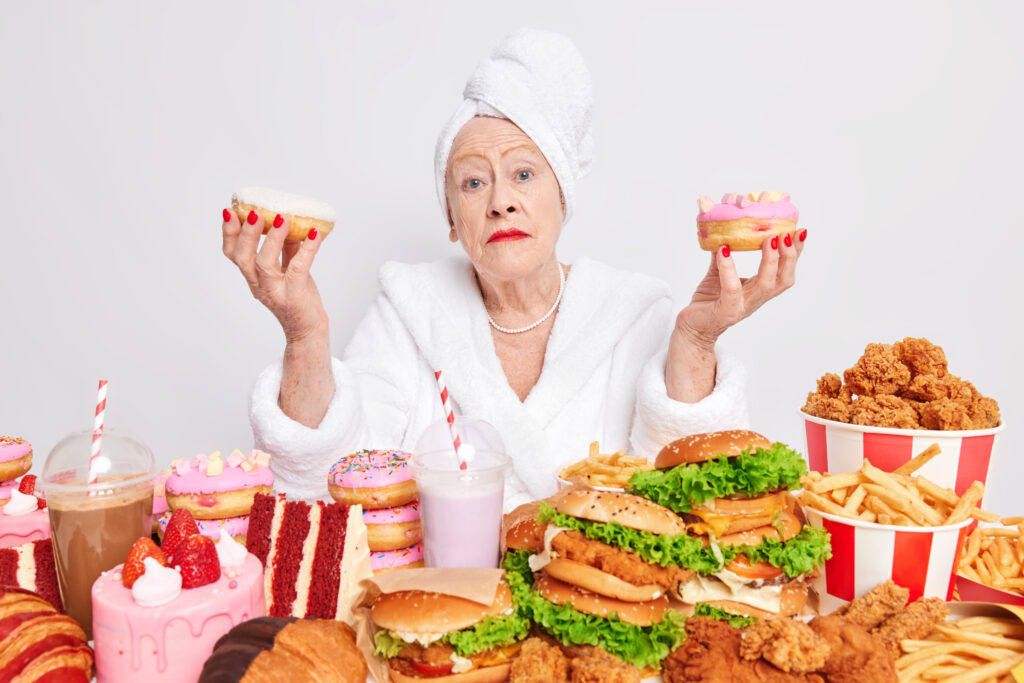Here we are going to share information on the topic “Know why foods like burger pizza and coke raise risk of depression.” The connection between nutrition and mental health has garnered more attention in recent years, especially in light of the rising incidence of depression. This article explores the possible processes by which meals like pizza, diet Coke, and hamburgers may raise the risk of depression. We can gain a better understanding of these foods’ potential influence on mental health outcomes by looking at their nutritional makeup and effects on the body and brain.

Know why foods like burger pizza and coke raise risk of depression
The Diet Coke, Pizza, and Burgers’ Nutritional Profiles:
Saturated fats, refined carbs, and processed ingredients are common characteristics of pizza and burgers. These substances have the potential to alter hormone balance, exacerbate inflammation within the body, and damage brain tissue. Furthermore, eating too many of these foods can cause metabolic problems and weight gain, both of which are linked to a higher risk of depression.
Because it has fewer calories than regular soda, Coke is promoted as a healthy option, although it really contains artificial sweeteners like aspartame. Although these sweeteners give sweetness without the extra calories of sugar, there has been debate about their possible impact on mental and emotional well-being. According to some research, artificial sweeteners may change the gut flora and interfere with neurotransmitter activity, which may affect mood regulation and raise the risk of depression.
The Link Between Burgers, Pizza, Coke, and Increased Depression Risk
Of course, the following are some reasons why depressing foods like pizza, burgers, and soda may be more likely to cause depression:
Nutritional Deficiency
Saturated fats, carbohydrates, and calories abound in fast food items like pizza and burgers, but vital nutrients like vitamins, minerals, and antioxidants are often lacking. Consuming these items on a regular basis might result in nutritional deficiencies, which raise the risk of depression
Blood Sugar Imbalance
Quick rises and falls in blood sugar levels can be brought on by foods high in refined sugar, such as soda and other fast food products. These variations may exacerbate depressive symptoms by interfering with the hormones and neurotransmitters in the brain that control mood.
Inflammation
Processed foods, such as pizza and hamburgers, frequently have high fat and additive content, which can aggravate inflammation in the body. Depression is one of the many mental health conditions that are associated with chronic inflammation.
Gut Health
By changing the makeup of gut bacteria, unhealthy eating choices can have a detrimental effect on gut health. Recent studies indicate a robust correlation between intestinal health and mental well-being. An increased risk of depression and other mood disorders has been linked to poor gut health.
Brain Chemistry
Eating certain food additives, like artificial colorings, flavorings, and preservatives that are included in fast food, might cause abnormal neurotransmitter activity and brain chemistry. This disturbance may have an impact on mood control and exacerbate symptoms of depression.
Addicting Properties
Because fast food and sugary drinks like Coke include a lot of sugar, salt, and fat in addition to flavor-enhancing ingredients, they may be addictive. The pattern of wanting and eating certain foods might worsen depressive symptoms and have a detrimental effect on mental health.
Psychological Factors
Eating comfort foods like pizza, burgers, and soda might make you feel good momentarily or relieve tension or bad sentiments. But relying too much on these foods as a coping strategy might have long-term detrimental effects on mental health, such as a higher chance of depression.
Diet’s Effect on Brain Function:
The minerals and substances included in the food we eat have a profound effect on our brains. It has been demonstrated that diets high in refined carbs and saturated fats reduce cognitive performance and raise the risk of neurological illnesses. These meals have the potential to cause oxidative stress, inflammation, and malfunction in the prefrontal cortex and hippocampal regions of the brain, which are important in mood regulation.
In addition, the production of neurotransmitters and signaling molecules that affect mood and behavior by the gut bacteria is another important function of the gut-brain axis in mental health. Processed food diets have the potential to upset the gut microbiota’s equilibrium, which can result in dysbiosis and increased intestinal permeability. The development of depression and other mood disorders has been linked to this syndrome, also referred to as “leaky gut.”
The Function of Inflammation
It is becoming more widely acknowledged that inflammation plays a significant role in the aetiology of depression. Saturated fat, refined sugar, and processed food diets can increase systemic inflammation, which can aggravate depression symptoms and mood swings. Depression has been linked to chronic inflammation’s ability to dysregulate the hypothalamic-pituitary-adrenal (HPA) axis, interfere with neurotransmitter function, and impair neuroplasticity.
Furthermore, inflammatory cytokines produced by the immune system have the ability to pass across the blood-brain barrier and influence brain activity directly. In animal models, these cytokines can cause neuroinflammation, change the metabolism of neurotransmitters, and lead to the emergence of depressive-like behaviours. Therefore, a molecular connection between diet and depression may exist due to the inflammatory consequences of specific dietary patterns.
The Impact of Lifestyle Factors
Diets high in pizza, hamburgers, and other fast food items have direct affects on brain function. In addition, Coca-Cola is frequently linked to other aspects of lifestyle that can exacerbate depression. These items are frequently eaten as part of the typical Western diet, which is low in fruits, vegetables, and whole grains and heavy in processed foods, red meat, and sugary drinks.
In addition to being linked to sedentary behaviour, smoking, and alcohol consumption, the Western diet is also linked to these risk factors for depression. In addition, those who eat fast food and drink soda a lot can also be more prone to stress, inadequate social support, and socioeconomic inequality—all of which might raise the risk of depression.
Frequently asked questions
Know why foods like burger pizza and coke raise risk of depression
What effects do burgers and pizza have?
Answer: Consuming more ultra-processed food raises blood sugar levels steadily, which raises the risk of type 2 diabetes and contributes to obesity. Consequently, there may be a higher chance of cancer, heart disease, and stroke.
Do sugar substitutes contribute to depression?
Answer: According to a recent study, women who eat nine servings per day of ultra-processed, artificially sweetened foods have a 50% increased chance of developing depression. The Harvard Medical School and Massachusetts General Hospital researchers carried out the study, which was published in JAMA Network Open.
Is Coke on the diet a UPF?
Answer: Consuming any ultraprocessed food, such as crisps, ready-meals, and carbonated drinks, increases the risk of developing the blues, according to US researchers. Of all UPFs, sweetened drinks exhibited the highest risk increase, at 37%. Chemicals in the drinks, according to researchers, may alter brain chemistry in ways associated with poor mental health.
What health effects do hamburgers have?
Answer: Burgers are not very healthy, despite the fact that they are heavy in protein. “High levels of saturated fat in burgers can cause high cholesterol and heart disease,” explains registered dietitian Kimberly Wiemann, MS, RDN, of Long Island. This is the primary rationale behind the unhealthy reputation of burgers.
Does pizza ruin a diet?
Answer: Consuming prepared foods like pizza that contain refined grains has been linked to weight gain. People who consumed more than 70 grammes of prepared foods, such as pizza, on a daily basis were shown to have a higher likelihood of having belly fat compared to those who consumed fewer than 70 grammes. This study had 1,352 participants.
Does eating junk food make you depressed?
Answer: Are you experiencing depression, anxiety, or are you just having a “mentally unhealthy” day? Foods with a lot of processing can be the problem. According to recent studies, those who eat a lot of ultra-processed meals are more likely to suffer from depressive and anxious symptoms of poor mental health.
Why not drink Diet Coke?
Answer: These include gaining weight, digestive issues, heart issues, and a stronger desire for sweets. Studies conducted more recently have connected the habit of drinking diet Coke to a higher risk of stroke. The health issues that the study found have frequently been the subject of news reports.

Conclusion
Know why foods like burger pizza and coke raise risk of depression
In summary, there is a complicated and nuanced relationship between nutrition and depression. Burgers, pizza, and diet Coca-Cola may not directly cause depression, but when consumed in excess or as part of a poor eating pattern, it might alter the body’s chemistry and nervous system, which raises the possibility of mood disorders. These foods may have a major impact on the onset and course of depression symptoms by inducing inflammation, impairing brain function, and aggravating lifestyle variables linked to depression.
In the future, more investigation is required to clarify the precise processes by which dietary habits impact mental health outcomes and to pinpoint possible therapeutic approaches. To support normal brain function and lower the risk of depression, adopt a balanced diet that is high in whole foods, fruits, vegetables, and lean proteins and low in processed foods, saturated fats, and artificial sweeteners.
So, this is how the topic “Know why foods like burger pizza and coke raise risk of depression” has been addressed.
For more information related to these topics,
You may also visit our Instagram page by
Thank you!

